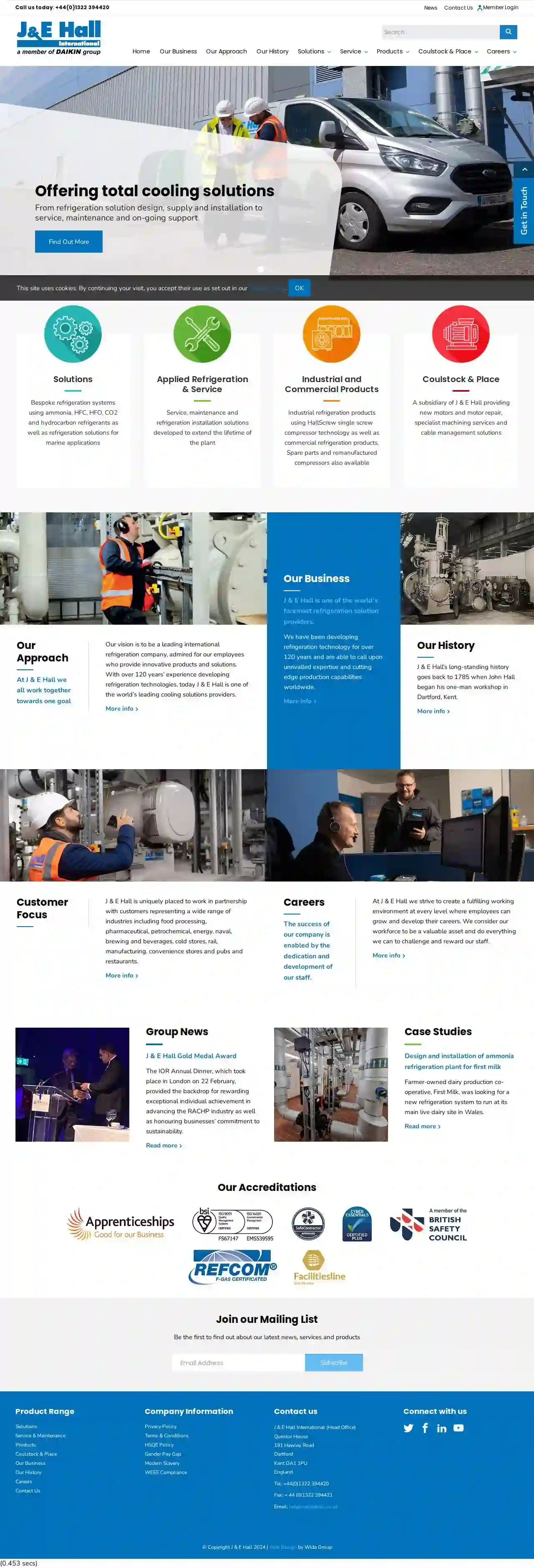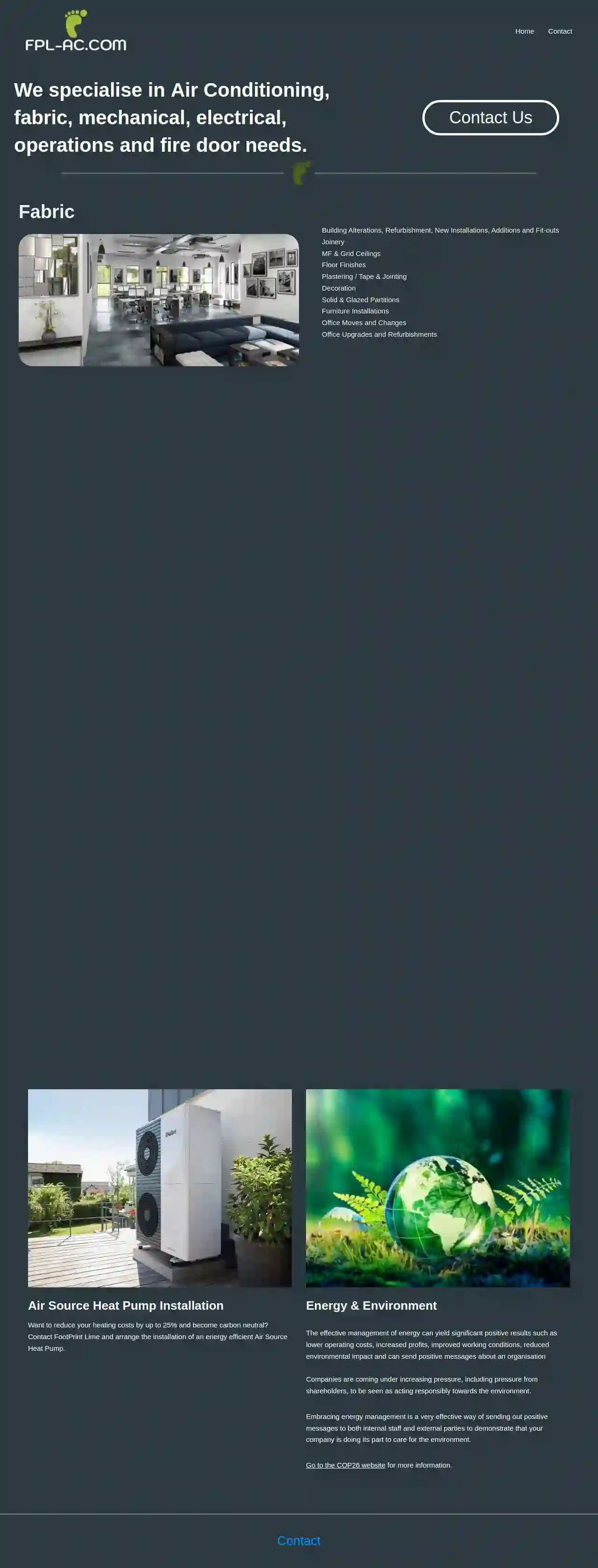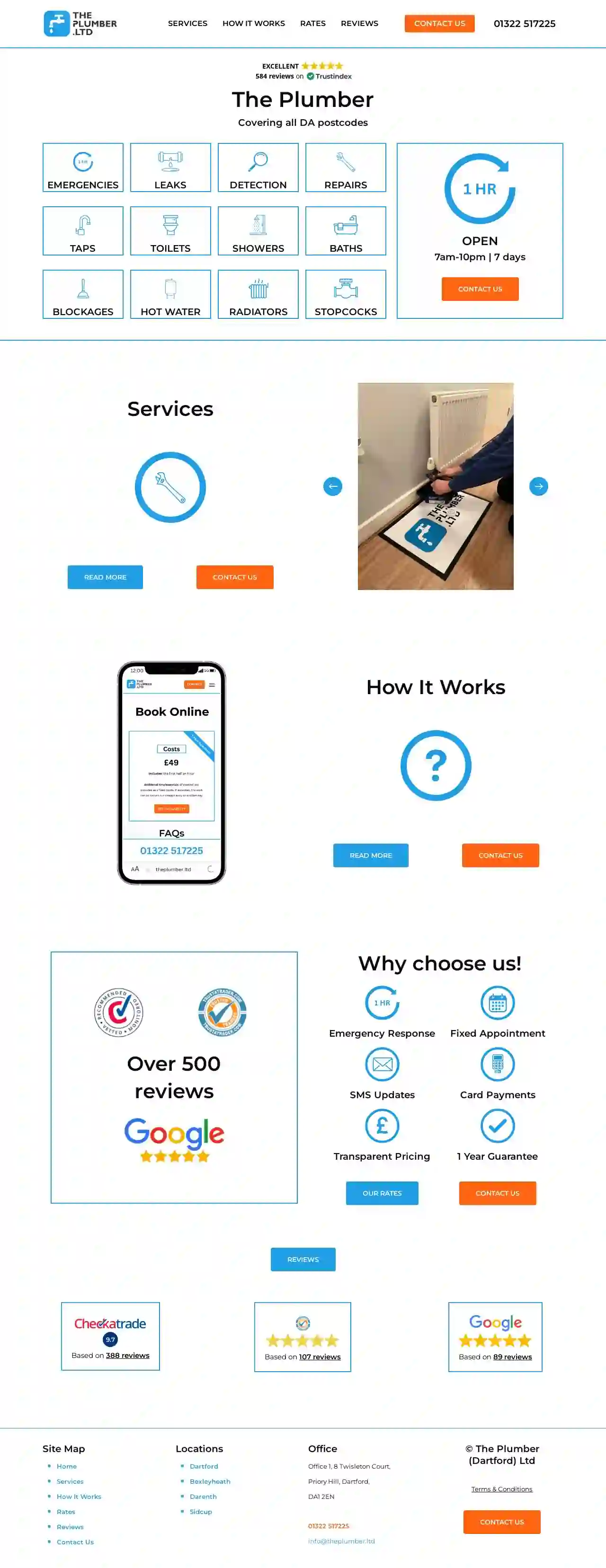Heat Pump Repair Dagenham
Find the best Heat Pump Service in Dagenham
Get 3 FREE Heat Pump Service quotes for your project today! Compare profiles, reviews, accreditations, portfolio, etc... and choose the best offer.

HeatFix - Emergency Plumber in Dartford
52 reviews99 High Rd, Dartford, DA2 7BW, GBHeatFix - Emergency Plumber in Dartford offers fast and specialist solutions to plumbing and heating emergencies. Our highly-trained professionals are available immediately for same-day call-outs. Gas and water emergencies can be very serious if ignored or left too long, which is why we offer emergency plumbing 24 hours a day, seven days a week. No matter where in the UK you live, we will be on hand to fix your plumbing problem and get you back to normality. A plumbing emergency can turn into a plumbing disaster very quickly. Don’t wait for things to get worse. Contact our emergency plumbers on 01322 466918 immediately. Our services include: Plumbing Pipe Work Pumps & Valves Showers supplied & fitted Tanks & Overflows Toilets, Systems & Taps Bathroom Suites Emergency Work Same day call outs Heating Services: Boiler Repair Boiler Servicing Radiator Repair Radiator Replacement Temperature Controls Power Flushing A-rated Central Heating Boiler Installs & Swaps Landlord Safety Certs (CP12) Emergency Call Outs: 24 Hour Call Outs Water Leaks Boiler Repairs Internal Drainage Blocked Toilet / Sink Why Choose Us? Our heating & plumbing repair and installation technicians are some of the best. Their skill, attitude and experience have meant that we have become a well-known company. 24/7 Emergency Always available to take your call, and send an engineer to help if your in an emergency. Expert and Professional We pride ourselves on our team of experienced professionals Satisfaction Guarantee We guarentee only the upmost quality Where to find us 99 High Rd, Dartford DA2 7BW OPENING HOURS Saturday Open 24 Hours Sunday Open 24 Hours Monday Open 24 Hours Tuesday Open 24 Hours Wednesday Open 24 Hours Thursday Open 24 Hours Friday Open 24 Hours Copyright 2020 | HeatFix - Emergency Plumber in Dartford
- Services
- Why Us?
- Gallery
Get Quote
Living Management Services Ltd
123a Pettit's Lane, Romford, RM1 4EJ, GBLIVING MANAGEMENT SERVICES LTD is a professional general maintenance business providing gas and plumbing services. We have over nine years of experience and have qualified heating engineers that provide a friendly and reliable service each time. We work across Essex, Kent, and London, offering a range of services including bathroom and kitchen plumbing, smart installations, gas boiler service, installs and repairs, vented and un-vented systems, underfloor heating, and more. Contact us today for a free quotation.
- Services
- Why Us?
- Gallery
Get Quote
J & E Hall Ltd
12 reviewsQuestor House, 191 Hawley Road, Dartford, DA1 1PU, GBJ & E Hall is one of the world’s leading cooling solutions providers, with over 120 years of experience in developing refrigeration technologies. They offer a comprehensive range of products and services, from bespoke refrigeration systems to industrial and commercial refrigeration products, as well as spare parts and remanufactured compressors. J & E Hall is committed to providing innovative and energy-efficient solutions to meet the needs of their customers worldwide.
- Services
- Why Us?
- Gallery
Get Quote
Universal Mechanical Services Ltd
51 reviewsBromley, GBUniversal Mechanical Services Ltd (Umech) is a leading provider of comprehensive mechanical services for both commercial and residential properties. We specialize in designing, installing, and maintaining a wide range of systems, including air conditioning, chilled water, LTHW, ventilation, ductwork, plumbing, heating, BMS, and water treatment. Our team of experienced engineers is dedicated to delivering optimum comfort and efficiency to our clients. We pride ourselves on our commitment to innovation, quality workmanship, and exceptional customer service. Umech has a proven track record of success, having completed numerous projects for prestigious clients across London and the surrounding home counties. We are an award-winning company with a reputation for excellence in design and execution. We offer a comprehensive range of services, including: Air Conditioning: Split type systems, VRV/VRF, and close control Chilled Water and LTHW Two and Four Pipe Fan Coil Units Ductwork and Ventilation Services Insulation and Acoustics Plumbing and Heating Building Management Systems (BMS) Water Treatment: Flushing works, biocide and inhibitor introduction, and chlorination Leak Detection We also provide full planned maintenance services to ensure that all systems operate efficiently and reliably. Our team is available 24/7 for emergency call-outs, with a four-hour response time. Contact us today to discuss your mechanical service needs.
- Services
- Why Us?
- Gallery
Get Quote
KW Heating
53 reviewsDartford, GBTrustATrader is a directory of tradespeople you can trust because their place on the website depends upon their quality of service. We provide a platform for customers to find and review trusted traders, and for traders to showcase their skills and services. Our mission is to connect customers with reliable and skilled tradespeople, and to help traders grow their businesses through our exclusive membership program.
- Services
- Why Us?
- Accreditations
- Our Team
- Testimonials
- Gallery
Get Quote
Fpl-AC
Orpington, GBFootPrint Lime is a leading provider of comprehensive building services, specializing in Air Conditioning, Fabric, Mechanical, Electrical, Operations, and Fire Door needs. We offer a wide range of services, from building alterations and refurbishments to HVAC system installations and energy management solutions. Our team of experienced professionals is dedicated to delivering high-quality workmanship and exceptional customer service. We understand that every project is unique, and we work closely with our clients to understand their specific needs and requirements. Whether you're looking for a complete building overhaul or a simple repair, we have the expertise and resources to get the job done right. At FootPrint Lime, we are committed to sustainability and environmental responsibility. We offer a range of energy-efficient solutions, including Air Source Heat Pumps, to help our clients reduce their carbon footprint and operating costs. Contact us today to learn more about our services and how we can help you achieve your building goals.
- Services
- Why Us?
- Gallery
Get Quote
WarmFront Heating
41 reviewsLoughton, IG10, GBWe are a Professional Plumbing Team. We have combined experience of over 75 years. We can help you with plumbing problems and any other issues related to heating and drainage. We understand that plumbing and heating emergencies can be very frustrating. That's why our trained plumbers and heating engineers are available 24 hours a day, 7 days a week. In case of an emergency, our customer service team will allocate an engineer that is closest to your location. The average waiting time is less then an hour. We are clear and upfront about our prices. We never charge extra for parking and London congestion. The rate we quote is the rate you pay. it's as simple as that! Our Gas Safe registered engineers undergo a rigorous training before they are allowed to work on gas appliances unsupervised. We monitor our engineers to make sure they stay up to date with latest industry standards and regulations. All repairs and installations carried out by our expert plumbers and gas engineers are guaranteed for 12 months. Reported issues are always treated as priority by our customer service team, and are rectified as soon as possible. We provide free estimates on selected work for large plumbing and heating projects. Contact us for more details on how to obtain your free estimate.
- Services
- Why Us?
- Accreditations
- Gallery
Get Quote
The Plumber Ltd
4.971 reviewsPriory Hill, Dartford, Office 1, 8 Twisleton Court, DA1 2EN, GBThe Plumber is a local plumbing company serving all DA postcodes. We offer a wide range of services, including emergency plumbing, leak detection and repair, tap and toilet installations, shower and bath repairs, and more. We are available 7 days a week from 7am to 10pm. Our team of experienced plumbers is committed to providing high-quality, reliable service at competitive rates. We offer a 1-year guarantee on all our work and accept card payments.
- Services
- Why Us?
- Gallery
Get Quote
Premier Heating Services Ltd, Boiler Services Dartford
530 reviewsDartford, GBPremier Heating Engineers are your local plumbing & heating specialists, providing reliable and friendly service across London, Kent & Surrey. We pride ourselves on our 3 easy steps to a stress-free experience: 1. Relax! Our engineer will attend on the date & time you agreed. 2. Your repair will be complete, leaving your appliance back up & running. 3. You can pay by cash or card on completion of the works. We are an approved company by: Don’t just take our word for it…See what our happy customers are saying about our plumbing & heating services & about their experiences. Our Plumbing Services include: Full plumbing installation Ball Valves & Tanks Hot water Problems Water Softeners Blocked Wastes Tap Repairs & Fitting Toilet Repair & Fitting Kitchen plumbing first & second fix Bathroom plumbing first & second fix Our Boiler & Heating Services in London & The South East include: Boiler & heating Installation Boiler Servicing Central Heating Repairs Power Flushing Hot Water Cylinders Immersion Heaters Radiators & Valves Landlord Gas Certificate At Premier, we are proud to offer our plumbing & heating services in all postcodes listed below. For home owners, procurement, social housing, letting agents, management companies & Landlords. for domestic, small commercial properties & new builds. London Postcodes: SE SW NW East West North Kent Postcodes: DA CT ME TN Surrey & Sussex Postcodes: RH CR KT TN GU TW SM
- Services
- Why Us?
- Gallery
Get Quote
Sky Air Conditioning Limited
517 reviewsForest Road Business Centre, 92A Forest Road, Unit 4, Loughton, IG10 1EQ, GBBased in Loughton in Essex, we offer a wide range of air conditioning and ventilation services for the domestic and commercial market. With working from home set to become the new normal, homeowners are looking for a cooling solution which looks the part as well as does the job. If you are finding your work space uncomfortable, we can help. Contact us today for a free, no obligation quotation.
- Services
- Why Us?
- Testimonials
- Gallery
Get Quote
Over 12,692+ HVAC Businesses on our directory
Our HVAC experts operate in Dagenham & surrounding areas!
HVACCompaniesHub has curated and vetted the Best HVAC Contractors in Dagenham. Find a reliable pro today.